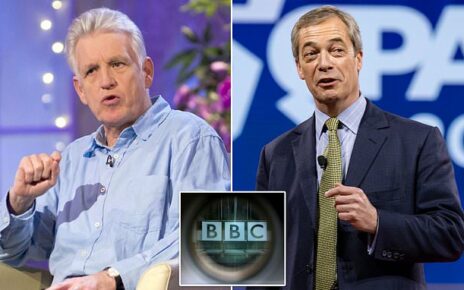Jacob Rees-Mogg accuses the BBC of bias in fiery radio interview as Business Secretary insists financial markets meltdown is ‘not necessarily’ to do with Kwasi Kwarteng’s mini-Budget fiasco
- Jacob Rees-Mogg accuses BBC of bias as he’s grilled over mini-Budget fiasco
- Business Secretary says markets chaos ‘more to do’ with interest rate differential
- Cabinet minister clashes with Radio 4 presenter Mishal Husain in fiery exchange
Jacob Rees-Mogg today accused the BBC of bias as he insisted the Government’s mini-Budget fiasco was ‘not necessarily’ to blame for the meltdown on financial markets.
The Business Secretary stressed the economic chaos was ‘much more to do’ with the Bank of England’s failure to raise interest rates in line with the US, rather than Chancellor Kwasi Kwarteng’s actions.
This week has seen fresh turmoil on the gilt market, along with continuing turbulence for pensions funds and in the price of the Pound.
It has added to pressure on Prime Minister Liz Truss and Mr Kwarteng to take action to reassure the markets in the wake of their tax-cutting mini-Budget last month, beyond their U-turn on scrapping the 45p tax rate.
But, speaking to BBC Radio 4’s Today programme, Mr Rees-Mogg insisted it was ‘speculation’ to blame the economic woe on the unfunded tax cuts the Chancellor announced three weeks ago.
In a fiery exchange with presenter Mishal Husain, the Cabinet minister suggested her questions were ‘not meeting the BBC’s requirement for impartiality’.

Jacob Rees-Mogg stressed the economic chaos was ‘much more to do’ with the Bank of England’s failure to raise interest rates in line with the US

In a fiery exchange with presenter Mishal Husain, the Cabinet minister suggested her questions were ‘not meeting the BBC’s requirement for impartiality’
Mr Kwarteng has promised to set out how he will balance the public finances following his mini-Budget when he reveals his ‘Medium-Term Fiscal Plan’ on 31st October.
Asked whether that statement should now be brought forward to reassure markets in the wake of the latest turmoil, Mr Rees-Mogg told Ms Husain: ‘Hold on, you suggest something is causal, which is a speculation.
‘What has caused the effect in pension funds, because of some quite high-risk but low-probability investment strategies, is not necessarily the mini-budget.
‘It could just as easily be the fact that the day before the Bank of England did not raise interest rates as much as the (US) Federal Reserve did.
‘I think jumping to conclusions about causality is not meeting the BBC’s requirement for impartiality.
‘It is a commentary rather than a factual question.’
Mr Rees-Mogg insisted the turbulence on financial markets was ‘much more to do with interest rates than it is to do with a minor part of fiscal policy’.
He noted how the ‘interest rate differential between the US and the UK has widened’ after the Federal Reserve announced a 0.75 percentage points hike last month, which was followed by only a 0.5 percentage points rise by the Bank of England.
Asked whether he was suggesting Britons should not be concerned about the financial turmoil of the last three weeks, Mr Rees-Mogg replied: ‘No, I’m saying it’s primarily caused by interest rate differentials rather than by the fiscal announcement.’
The Business Secretary said the mini-Budget’s announcements as a percentage of gross domestic product (GDP) were ‘not that enormous’ and ‘not out of the run of the mill of events that come before Parliament’.
Mr Rees-Mogg’s suggestion of BBC bias during his radio interview swiftly sparked a backlash.
Pat McFadden, Labour’s shadow chief secretary to the Treasury, posted on Twitter: ‘The Government’s tactics are clear: accept no responsibility for the economic chaos they’ve caused and blame anyone or anything else that they can.’
Liberal Democrat deputy leader Daisy Cooper said: ‘Jacob Rees-Mogg is denying economic reality, his bluff and bluster will do nothing to reassure people worried about their mortgages, pensions and living standards.’
Source: Read Full Article
